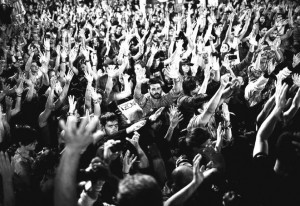 In one of Rome’s degraded suburbs, the Tufello neighbourhood, project ‘Puzzle’ was born. In areas like this one, local politicians are unable or unwilling to provide the community with basic services and leave residents to fend for themselves. The failures of institutional politics leave buildings which could provide essential services for the community empty and at threat of decay and speculation.
In one of Rome’s degraded suburbs, the Tufello neighbourhood, project ‘Puzzle’ was born. In areas like this one, local politicians are unable or unwilling to provide the community with basic services and leave residents to fend for themselves. The failures of institutional politics leave buildings which could provide essential services for the community empty and at threat of decay and speculation.
In the framework of a political and and economic crisis, Puzzle offers a new, self organised model of welfare, seen as a common good truly accessible to all. The political project goes from the rehabilitation of degraded spaces to supporting disadvantaged citizens, through the services provided.
To passers-by, the five-storey graffiti-covered building hosting Puzzle appears amenable to any other social centre. However, those who dare to venture onto its premises can discover a much more complex reality.
The project began nine months ago, when a group of over 100 people occupied an abandoned building. As explained by Gianmario, a medicine student involved in the project from the outset, “when we first entered the estate the walls were falling apart, and nothing worked from toilets to heating.” The once decaying premises now boasts two working kitchens, three working toilets, freshly painted walls, ten furnished rooms and a common area.
The objective of Puzzle is straightforward: offer services to those who need them and create a juridical precedent and a model that can be exported in an immediate future.
The idea was initially brought forward by Horus, a nearby social centre, though the project encompasses a variety of people with diverse backgrounds. Gianmario explains, “Since its very beginning this project wanted to go beyond the conventional idea of a social centre, starting from its very name: ‘Puzzle’; the intersection of different realities and people with different backgrounds.” As a matter of fact, groups involved with Puzzle range from Hours, engineering students, medicine students and neighbourhood associations.” Each of these different organisations sought to build a form of self government of the area from below and this building became the place from which to do it.”
One of the most notable services provided by Puzzle are the student dorms, which currently host eight people. These work in conjunction with the info point. The info point is held once a week at the Sapienza University and serves a twofold purpose. On one hand it provides legal counseling regarding renting issues, on the other it offers the opportunity to enter an ‘occupation list’ through which people can request to occupy the rooms at Puzzle. Moreover, the project offers Italian lessons for immigrants and private tutoring to support youths struggling in school.
However, as explained by Giannmario, “It is not a free for all. If you request to sleep at Puzzle it’s because you believe that affordable housing should be everyone’s right and thus you also take over the broader political project. Even a family taking their kids here for tutoring needs to be conscious that their decision is not just one of convenience, but a political one as well.” In this sense it also becomes a space through which to mobilise people who would usually not be involved with an occupied site.
Raffaele, a medicine student living at Puzzle since June, explains how being involved in the projected impacted upon his life. “It has been an experience of emancipation and political growth at an exponential level, which begins with everyday tasks. You not only imagine how to change a reality, but by dealing with the practical side of things such as building your bed or painting a wall. You realise how to do it with your own hands”.
Besides its highly particular and territorial aspects, the spirit of the project is very much in line with the values of other global movements. As explained by Raffaele, “Even if the practical manifestation differs – i.e. we have not occupied a big square and are having to maintain our presence with tents – the key word is the same: Occupy. In the sense of occupying, or rather taking over the things that concern you the most – for example the society in which you live. From that derives the demand for change and democracy.”
Despite the innumerable hurdles, Puzzle is growing and gradually taking shape. Though, as said by Giannmario “you won’t change the world through a building.” But perhaps, by linking up and comparing national and international efforts, we can start putting together the particular pieces for a global alternative.




